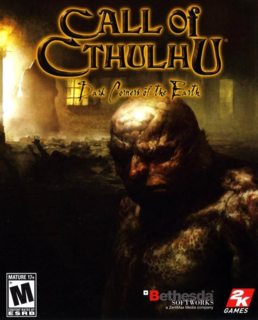Call of Cthulhu is more about mood and ambience than amazing graphics. Was it worth the wait? You bet.
Call of Cthulhu is a first person action/adventure game set in the early 1900s. You play as ex-cop turned private detective Jack Walters who is on assignment investigating a missing persons case. The journey starts off as a simple whodunit but quickly transforms into a frenzied escape as you are pursued by murderous followers of a mysterious cult.
On first glance, the game resembles a run of the mill first person shooter, but looks are deceiving in the case of Call of Cthulhu. For the first few hours, you must survive on wits alone. Once your cover is blown, you must hide in the shadows and evade capture from your pursuers in a slick game of cat and mouse. As you uncover the sinister happenings plaguing a backwater fishing town, you begin to lose your mind through a series of clever flashbacks and hallucinations. Later on you get your hands on a variety of period-specific weapons as the game shifts gears and becomes more action-heavy.
It's the immersive moments like these that really separate Call of Cthulhu from most of its contemporaries, save for classic horror titles like Nintendo's Eternal Darkness. But unlike the third-person GameCube title, you are truly immersed in the action since every action is seen from the eyes of your character. As insanity sets in, you feel the controller vibrate in your hands, your breathing becomes heavy and forced, and your vision becomes warped.
About the only complaint one can levy against Call of Cthulhu is regarding the voice acting. The dialogue writing is solid, but the forced (and very hammy) delivery by the main character and his colleagues is cringe-inducing. Luckily the game survives on its strong story and solid gameplay rather than its attempt at playing out like an interactive H.P. Lovecraft film.
Call of Cthulhu is more about mood and ambience than amazing graphics. While the game does indeed look good, there are far better looking titles out there like last year's Chronicles of Riddick: Escape from Butcher Bay. You don't get that same sense of hiding in the shadows as you do with Riddick or Splinter Cell from the visuals, though the audio more than makes up for it.
Much of what makes Chthulhu an immersive experience is the sound design. Whether you're overhearing a conversation between two goons patrolling a warehouse or simply listening to the ambient noises of a murky sewer, you always feel like you're knee-deep in the action. So what the game lacks in polished visuals and Hollywood-quality voice acting it makes up by providing a convincing experience.
The game mechanics are what you'd expect—aside from exploring the environment and collecting clues, you must also solve the occasional environmental puzzle. Every bit of evidence you find is catalogued in your inventory and you can pause the game at any time to read through the many scraps of paper you've amassed in your collection. While the combat is certainly visceral, the adventure portions of the game stand up solidly on their own. In short, the game provides a nice balance between action and adventure.
So don't toss your Xbox just yet. If Call of Cthulhu: Dark Corners of the Earth is any indication, there's still plenty of life left in the system. Those looking for an immersive hybrid of action, adventure, and horror will not be disappointed.
(Originally published at Console Game World)

